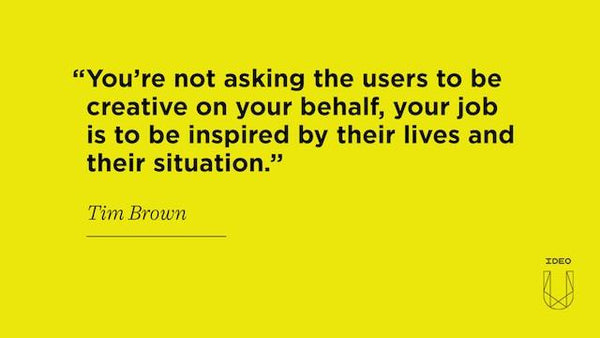Tim Brown on Nudging Your Company Culture Toward Creativity
“When designing a ritual: don’t overthink it, just build the first thing you can, then move to more sophisticated versions later.”
- Tim Brown, CEO and president of IDEO
We sat down with IDEO CEO Tim Brown to talk about nudging an organization's culture toward behaviors and beliefs that support creative work. Here are a few of our favorite highlights:
Nudge Company Culture through Rituals
Rituals help create a culture where people are empowered to be creative within an entire company. They create a constant nudging so that, over time, a culture learns to do something naturally and intuitively. One ritual we have at IDEO is an end of project celebration—a moment where every participant in the project gets recognized in some way. It creates an important sense of completion among teams.
Design Rituals
Think about rituals as a design problem; prototype them first. When designing a ritual, don’t overthink it, just build the first thing you can, then move on to more sophisticated versions later. Rituals are most valuable around things that have an emotional component to them. Most are designed to create some emotional sense—more connection, a sense of completion, reflection. When designing a ritual think about what elements make it engaging and get people out of whatever mindset they’re in and into a new one.

Measure the Effectiveness of Rituals
Most rituals that have stuck at IDEO have been self-evident. The most important measurement technique to understand the value of the ritual is that sense the leader has of the overall culture. It puts a demand on leaders to be more thoughtful and take the time to reflect on the state of the culture. As we’ve done a better job of measuring what goes on in organizations, the levels of employee engagement have gone down. There’s a disconnect there. We’re focusing on measuring things that don’t really matter when it comes to engagement.
Keep Ideas From Being Squashed
When working within cultures that aren’t receptive to new ideas, Tim suggests the concept of "idea fitness." The fitter your idea is the more likely it will be to survive in the outside world. The more evidence your idea has to support it—prototypes that show your idea works, compelling stories that show how your idea is meaningful, plans on how the idea will move forward, user insights—the more likely it will be to survive.
---
Creative Culture Webinar Chapters
(:40) The clown ritual: Share a smile and a life story with a stranger and break from the expected behavior.
(2:52) The humble brag ritual: Build trust as a team grows and get to know people through humble brags.
(5:32) Course overview: 3 lessons from our Leading for Creativity course: Leading from the front by being at the helm but still asking questions, Leading alongside to help guide like a coach along the way, and Leading through culture by setting the conditions in the organization for different kinds of beliefs and behaviors to take place.
(7:25) How rituals shape our work: Recognize a behavior that gets in the way of our ultimate objectives and put rituals in place to do something about it.
(10:55) A ritual for giving tough feedback: A ritual designed by one IDEO U learner to help his team give and receive tough feedback.
(15:15) A ritual for collaboration: An IDEO U learner prototyped a ritual to make collaboration around ideas more visible by floating ideas around the office on balloons.
(17:24) Don’t overthink it: Build the first thing you can and if it seems valuable move on to more sophisticated versions later.
(17:42) Measure the effectiveness of rituals: The most important measurement is the observation by leaders of the overall state of the culture.
(22:06) Create space for collaboration: What’s the goal of the collaboration? If it’s increased connection, the 3-minute workout ritual is worth a try.
(25:26) Types of collaboration: Asynchronous collaboration is a way to contribute to other people’s work when convenient vs. the type of collaboration where everyone is working together on the same project at the same time.
(26:28) Rituals for remote teams: Video wormholes between locations, warm-up activities at the beginning of virtual calls, celebrating and discussing inspirations.
(31:01) Rituals to facilitate user-centered culture: bring users into the room, not asking the users to be creative on your behalf, but being inspired by their lives and their needs.
(33:41) Keep good ideas from being squashed: Idea fitness - the fitter your idea is the more likely it will be to survive.
(37:52) Rituals to overcome hidden agendas: Unlocking of hopes and fears and getting people to be honest about their hopes for particular projects and events.
(39:31) How a junior person can lead for creativity: Be willing to ask questions that can inspire and incite others to think about things they wouldn’t have thought about.
(42:56) Positive competition: IDEO does project show and tells to outshine each other in a positive, fun way.
Learn how to move your organization's culture toward beliefs and behaviors that support creative work—learn the craft of leading for creativity. Check out our Leading for Creativity online course.
- choosing a selection results in a full page refresh
- press the space key then arrow keys to make a selection



